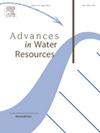Real-time forecasting of coastal flood inundations under regulated reservoir and storm-tide influences
IF 4
2区 环境科学与生态学
Q1 WATER RESOURCES
引用次数: 0
Abstract
Coastal regions are vulnerable to flood risks due to the combined effects of storm surges, riverine flooding, upstream reservoir releases, and inland rainfall. Traditional models often fail to integrate these critical factors, leading to inaccuracies in flood extent forecasting. This study addresses this gap by developing a comprehensive coastal flood inundation forecasting framework for a region impacted by tropical cyclones and extreme inland rainfalls. This framework combines components for realtime reservoir inflow forecasting, reservoir outflow forecasting based on rule curves, storm-tide forecasting using hydrodynamic and machine learning models, and flood inundation forecasting with a two-dimensional hydrodynamic model. The model was field-tested in the twin Brahmani-Baitarani rivers in eastern India, with the simulated coastal flood extents being validated against the Sentinel-1 satellite imageries for different tropical cyclone events. The results demonstrate that the proposed framework could forecast the coastal inundation extents, with the fit measures ranging from 87.45 % to 39.57 % at 1- to 8-days’ lead times. This study underscores the importance of all causative factors of coastal flooding, providing a valuable tool for early warning systems and flood risk management in vulnerable coastal regions worldwide.

水库调控和风暴潮影响下的沿海洪水淹没实时预报
由于风暴潮、河流洪水、上游水库释放和内陆降雨的综合影响,沿海地区容易遭受洪水风险。传统的模型往往不能整合这些关键因素,导致洪水范围预测不准确。本研究通过为受热带气旋和内陆极端降雨影响的地区开发一个全面的沿海洪水淹没预报框架来解决这一差距。该框架结合了实时入库预测、基于规则曲线的出库预测、基于水动力和机器学习模型的风暴潮预测以及基于二维水动力模型的洪水淹没预测等组件。该模型在印度东部的Brahmani-Baitarani两条河流中进行了实地测试,模拟的沿海洪水范围与Sentinel-1卫星图像对不同热带气旋事件进行了验证。结果表明,该框架能较好地预测沿海淹没程度,在1 ~ 8天的预估时间内,拟合度在87.45% ~ 39.57%之间。该研究强调了沿海洪水所有致病因素的重要性,为全球沿海脆弱地区的早期预警系统和洪水风险管理提供了有价值的工具。
本文章由计算机程序翻译,如有差异,请以英文原文为准。
求助全文
约1分钟内获得全文
求助全文
来源期刊

Advances in Water Resources
环境科学-水资源
CiteScore
9.40
自引率
6.40%
发文量
171
审稿时长
36 days
期刊介绍:
Advances in Water Resources provides a forum for the presentation of fundamental scientific advances in the understanding of water resources systems. The scope of Advances in Water Resources includes any combination of theoretical, computational, and experimental approaches used to advance fundamental understanding of surface or subsurface water resources systems or the interaction of these systems with the atmosphere, geosphere, biosphere, and human societies. Manuscripts involving case studies that do not attempt to reach broader conclusions, research on engineering design, applied hydraulics, or water quality and treatment, as well as applications of existing knowledge that do not advance fundamental understanding of hydrological processes, are not appropriate for Advances in Water Resources.
Examples of appropriate topical areas that will be considered include the following:
• Surface and subsurface hydrology
• Hydrometeorology
• Environmental fluid dynamics
• Ecohydrology and ecohydrodynamics
• Multiphase transport phenomena in porous media
• Fluid flow and species transport and reaction processes
 求助内容:
求助内容: 应助结果提醒方式:
应助结果提醒方式:


